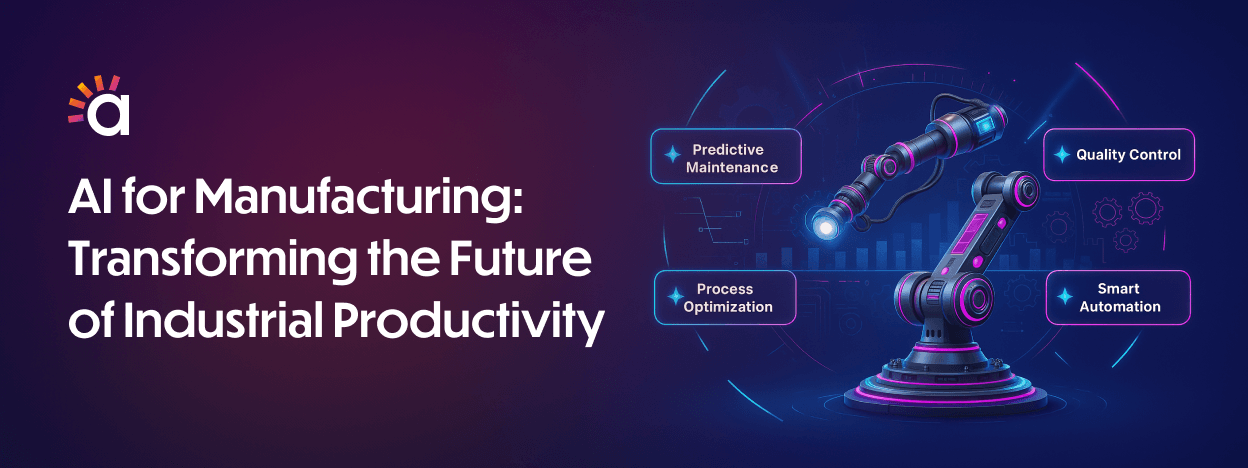AI for Manufacturing: Transforming the Future of Industrial Productivity

Artificial Intelligence (AI) is redefining how factories operate — making manufacturing smarter, faster, safer, and more efficient. From predictive maintenance and real-time quality inspection to autonomous robots and data-driven decision-making, AI enables manufacturers to reduce costs, minimize downtime, and boost production quality.
What Is AI in Manufacturing?
AI in manufacturing refers to the use of machine learning, computer vision, predictive analytics, and automation to optimize production processes, supply chains, and equipment performance.
It helps transform traditional factories into “smart factories” — systems that learn from data, self-optimize, and continuously improve without manual intervention.
Top AI Applications in Manufacturing
1. Predictive Maintenance
AI models analyze machine sensor data to predict failures before they happen.
🔹 Prevents unplanned downtime
🔹 Optimizes maintenance schedules
🔹 Extends machinery lifespan
Example: Using vibration and temperature data from machines to predict bearing wear or motor failure.
2. Quality Control & Defect Detection
Computer vision systems powered by AI inspect products in real-time for cracks, color defects, or shape irregularities.
🔹 Improves consistency and reduces waste
🔹 Enables 100% inspection coverage
🔹 Outperforms human accuracy
Example: AI cameras in automotive or semiconductor plants detecting micro defects invisible to the human eye.
3. Process Optimization
AI learns from thousands of production runs to identify optimal settings (temperature, pressure, speed) that improve throughput and quality.
🔹 Reduces energy use
🔹 Improves yield rates
🔹 Enables adaptive process control
Example: Chemical manufacturing plants using AI to optimize catalyst efficiency and reaction parameters.
4. Supply Chain & Demand Forecasting
AI forecasts demand, detects supply risks, and optimizes inventory management.
🔹 Balances supply and demand
🔹 Reduces logistics costs
🔹 Prevents raw material shortages
Example: FMCG and food processing units using AI for seasonal demand prediction.
5. Robotics & Automation
AI-driven robots (and cobots) perform repetitive or hazardous tasks efficiently.
🔹 Ensures worker safety
🔹 Reduces labor costs
🔹 Enables flexible, 24×7 production
Example: Assembly line robots that learn new configurations through reinforcement learning.
6. Energy Management
AI monitors real-time energy usage across equipment and optimizes power consumption.
🔹 Reduces utility costs
🔹 Identifies energy leaks or inefficiencies
🔹 Supports sustainability goals
Example: AI adjusting HVAC and compressor operations based on production load.
7. Digital Twins & Simulation
A digital twin is a virtual model of a factory or machine that mirrors its real-world behavior.
🔹 Enables testing without disrupting production
🔹 Predicts performance under new conditions
🔹 Aids R&D and process improvements
Example: Aerospace or heavy engineering plants simulating machine loads or new assembly layouts.
AI-Powered Tools and Technologies
• Machine Learning (ML): Pattern recognition for predictive maintenance
• Computer Vision: Automated inspection & defect detection
• Natural Language Processing (NLP): Intelligent dashboards and voice-based operator assistance
• IoT + Edge AI: Real-time analytics from connected machines
• Digital Twins: Virtual simulations for design and process control
Benefits of AI in Manufacturing
- Reduced Downtime – Up to 30–50% fewer machine breakdowns
- Higher Productivity – 20–30% improvement in overall efficiency
- Improved Quality – 90%+ accuracy in defect detection and inspection
- Cost Reduction – 15–25% lower operational costs through automation and optimization
- Sustainability – Optimized energy and resource utilization for greener production
- Faster Decision-Making – Real-time analytics and AI-powered insights enabling quick, data-driven actions
Industry Examples
- Automotive – Predictive maintenance, autonomous assembly lines
- Pharmaceuticals – Process optimization, batch quality prediction
- Chemicals – Real-time process control, emission management
- Textiles – Defect detection in fabrics, demand forecasting
- Electronics – Component inspection, yield optimization
- Food Processing – Quality control, spoilage detection, logistics optimization
AI Adoption in Indian Manufacturing
India’s “Make in India” and “Industry 4.0” initiatives are driving adoption of AI across:
• Automotive hubs (Pune, Chennai, Gurugram)
• Chemical clusters (Gujarat, Maharashtra)
• Pharma zones (Hyderabad, Ahmedabad)
• Electronics parks (Noida, Sriperumbudur, Bengaluru)
Government-backed programs like the Digital India Initiative and National AI Mission are supporting R&D, data infrastructure, and upskilling in AI manufacturing.
Future of AI in Manufacturing
• AI + IoT integration → Fully autonomous “smart factories”
• AI + Robotics → Collaborative and adaptive production lines
• AI + Blockchain → Traceability and transparent supply chains
• AI + AR/VR → Immersive maintenance and training tools
• AI for Sustainability → Carbon footprint reduction and green energy optimization
If you’re exploring ways to integrate AI into your manufacturing operations, our team would be happy to assist. Connect with our experts to discuss your challenges, goals, and the right AI implementation strategies tailored for your business.

